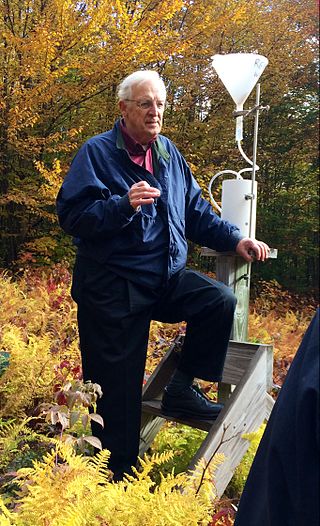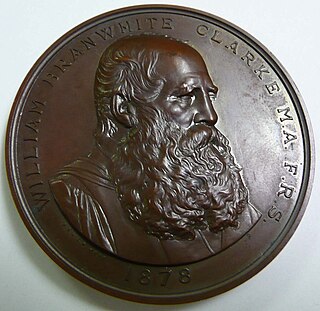Related Research Articles

Pierre Dansereau was a Canadian ecologist from Quebec known as one of the "fathers of ecology".

Gene Elden Likens is an American limnologist and ecologist. He co-founded the Hubbard Brook Ecosystem Study at the Hubbard Brook Experimental Forest in 1963, and founded the Cary Institute of Ecosystem Studies in Millbrook, New York in 1983.
Hugh Francis Durrant-Whyte is a British-Australian engineer and academic. He is known for his pioneering work on probabilistic methods for robotics. The algorithms developed in his group since the early 1990s permit autonomous vehicles to deal with uncertainty and to localize themselves despite noisy sensor readings using simultaneous localization and mapping (SLAM).
Simon Asher Levin is an American ecologist and the James S. McDonnell Distinguished University Professor in Ecology and Evolutionary Biology and the director of the Center for BioComplexity at Princeton University. He specializes in using mathematical modeling and empirical studies in the understanding of macroscopic patterns of ecosystems and biological diversities.

The Clarke Medal is awarded by the Royal Society of New South Wales, the oldest learned society in Australia and the Southern Hemisphere, for distinguished work in the Natural sciences.

Hugh Phillip Possingham, FAA, is the former Queensland Chief Scientist and is best known for his work in conservation biology, applied ecology, and basic ecological theory including population ecology. He is also a professor of mathematics, Professor of Zoology and an ARC Laureate Fellow in the Department of Mathematics and the School of the Environment at The University of Queensland.

Matthew England is a physical oceanographer and climate scientist. He is currently Scientia Professor of Ocean & Climate Dynamics at the University of New South Wales, Sydney, Australia.
Richard J. Hobbs FAA, is a distinguished professor, ARC Australian Laureate Fellow and ecologist at the University of Western Australia, Perth, Australia. He is a fellow of the Australian Academy of Science and a Highly-Cited author who has written extensively in the areas of vegetation dynamics and management, ecosystem fragmentation, ecosystem rehabilitation and restoration, landscape ecology, and conservation biology. Current research focuses on managing ecosystems in a rapidly changing world.
Mark A. Burgman is an Australian ecologist, Professor at the University of Hawaiʻi at Mānoa from 2024 and Emeritus Professor of Risk Analysis & Environmental Policy and former Director of the Centre for Environmental Policy at Imperial College London. He was Director of the Australian Centre of Excellence for Risk Analysis (ACERA), latterly CEBRA, and Adrienne Clarke Chair of Botany at the University of Melbourne until 2017. He co-led The SWARM Project at the University of Melbourne.
David William Schindler,, was an American/Canadian limnologist. He held the Killam Memorial Chair and was Professor of Ecology in the Department of Biological Sciences at the University of Alberta in Edmonton, Alberta. He was notable for "innovative large-scale experiments" on whole lakes at the Experimental Lakes Area (ELA) which proved that "phosphorus controls the eutrophication in temperate lakes leading to the banning of phosphates in detergents. He was also known for his research on acid rain. In 1989, Schindler moved from the ELA to continue his research at the University of Alberta in Edmonton, with studies into fresh water shortages and the effects of climate disruption on Canada's alpine and northern boreal ecosystems. Schindler's research had earned him numerous national and international awards, including the Gerhard Herzberg Gold Medal, the First Stockholm Water Prize (1991) the Volvo Environment Prize (1998), and the Tyler Prize for Environmental Achievement (2006).

Richard Shine is an Australian evolutionary biologist and ecologist; he has conducted extensive research on reptiles and amphibians, and proposed a novel mechanism for evolutionary change. He is currently a Professor of Biology at Macquarie University, and an Emeritus Professor at The University of Sydney.
Professor Herbert George Andrewartha, BS (UWA), MAgSc (Melb), DSc (Adel), FAA, was a distinguished Australian research scientist in the fields of entomology, biology, zoology and animal ecology.
Warwick Hugh Anderson, medical doctor, poet, and historian, is Janet Dora Hine Professor of Politics, Governance and Ethics in the Discipline of Anthropology, School of Social and Political Sciences, and in the Charles Perkins Centre, University of Sydney, where he was previously an Australian Research Council Laureate Fellow (2012–17). He is also honorary professor in the School of Population and Global Health, University of Melbourne. He is a fellow of the Australian Academy of the Humanities, the Academy of Social Sciences in Australia, the Australian Academy of Health and Medical Sciences and the Royal Society of New South Wales, from which he received the History and Philosophy of Science Medal in 2015. For the 2018–19 academic year, Anderson was the Gough Whitlam and Malcolm Fraser Chair of Australian Studies at Harvard University, based in the History of Science Department.

Emma Letitia Johnston is the Deputy Vice Chancellor (Research) at the University of Sydney. She was former, Dean of Science at the University of New South Wales and President of Science & Technology Australia. She is an authority in marine ecology and a former Pro Vice-Chancellor (Research) at UNSW.

Charles Joseph Krebs is a professor emeritus of population ecology in the University of British Columbia Department of Zoology. He is also Thinker-in-residence at the Institute for Applied Ecology at the University of Canberra, Australia. He is renowned for his work on the fence effect, as well as his widely used ecology textbook Ecology: The Experimental Analysis of Distribution and Abundance.

Judith (Judy) H. Myers is a Canadian-American ecologist. In 2014, she was elected president of the Canadian Society for Ecology and Evolution, and served in that role until 2016. Professor Myers is well known for her decades-long research into plant-animal-microbe interactions, including insect pest outbreaks, viral pathogens of insects, and pioneering work on biological control of insects and plants, particularly invasive species. Throughout her career she has advocated strongly for both the public understanding of science and for increasing the number of women in the STEM subjects: Science, Technology, Engineering, and Mathematics.
Narayana Balakrishnan Nair (1927–2010) was a marine biologist, ecologist and the founder president of Kerala Science Congress. He was known for his advocacy of trawling ban during monsoon seasons which was later accepted and imposed by the Government of Kerala. A Jawaharlal Nehru fellow, Nair was an elected fellow of all the major Indian science academies as well as the Zoological Society of London. The Council of Scientific and Industrial Research, the apex agency of the Government of India for scientific research, awarded him the Shanti Swarup Bhatnagar Prize for Science and Technology, one of the highest Indian science awards, in 1971, for his contributions to biological sciences. He received the fourth highest Indian civilian honor of the Padma Shri in 1984.
Thavamani Jegajothivel Pandian, a retired professor of Madurai Kamaraj University (MKU), is an Indian geneticist and ecologist, known for his pioneering studies in bioenergetics and animal ecology. A recipient of the WorldFish Naga Award, he is a former chairman of the Task Force Committee on Aqua and Marine Biotechnology of the Department of Biotechnology of the Government of India, a former president and a fellow of The World Academy of Sciences and an elected fellow of the Indian National Science Academy, National Academy of Sciences, India, Indian Academy of Sciences and the National Academy of Agricultural Sciences. The Council of Scientific and Industrial Research, the apex agency of the Government of India for scientific research, awarded him the Shanti Swarup Bhatnagar Prize for Science and Technology, one of the highest Indian science awards, in 1984, for his contributions to biological sciences.
Marti J. Anderson is an American researcher based in New Zealand. Her ecological statistical works is interdisciplinary, from marine biology and ecology to mathematical and applied statistics. Her core areas of research and expertise are: community ecology, biodiversity, multivariate analysis, resampling methods, experimental designs, and statistical models of species abundances. She is a Distinguished Professor in the New Zealand Institute for Advanced Study at Massey University and also the Director of the New Zealand research and software-development company, PRIMER-e.
References
- 1 2 "Underwood, Antony James (Tony) (1947 - )". Encyclopedia of Australian Science. Retrieved 9 February 2024.
- ↑ Chapman, Gee; Gray, John (2006). "Tony Underwood: A Short Biography". Journal of Experimental Marine Biology and Ecology. 328 (2): 153–163. doi:10.1016/j.jembe.2006.06.017 . Retrieved 9 February 2024.
- ↑ ISI Web of Knowledge Archived 19 October 2006 at the Wayback Machine
- ↑ http://sydney.edu.au/science/bio/eicc/our_people/research_fellows/tony_underwood.shtml